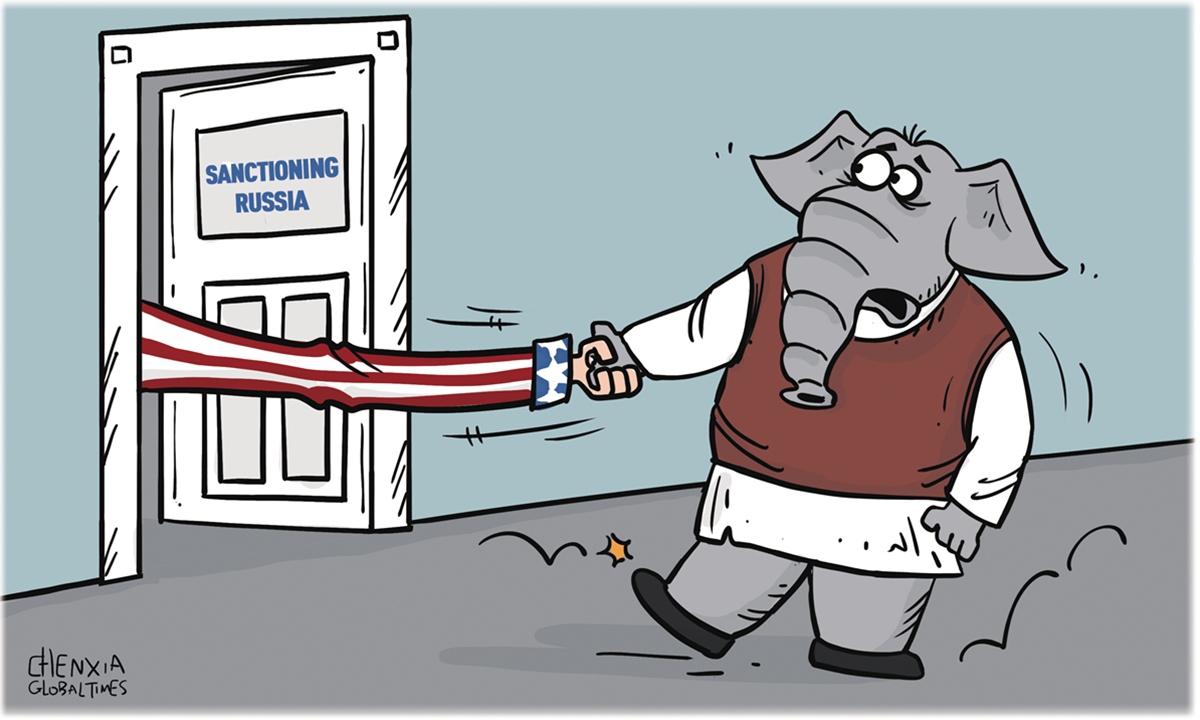
Illustration: Chen Xia/GT
In the face of a "disobedient" India when it comes to dealing with the Russia-Ukraine conflict, the West, which has started to show its anxiety, is building up pressure on New Delhi.
A recent Bloomberg report titled, "Germany weighs snubbing India as G-7 guest over Russia stance," is one of the latest examples on the list of pressures the West has piled on India. Although the contents of the report remains to be further confirmed, it's a proof of how Western media outlets are playing a role in forcing India to pick a side and join the sanctions against Russia.
Western politicians have been another crucial source of stress for India. Reports show that during a video call with Indian Prime Minister Narendra Modi, US President Joe Biden said that India's position in the world would not be enhanced by relying on Russian energy sources. British Prime Minister Boris Johnson, who in March urged India to join the West in condemning Russia, will head to India next week. Almost at the same time, European Commission President Ursula von der Leyen will also embark on her two-day visit to India. Observers are watching how Boris and von der Leyen will bring up the issue of India's stance on the Russia-Ukraine conflict during the tour.
Since the outbreak of the conflict, the West's pressure - especially from the US and its allies, including Australia and Japan - on India hasn't stopped, but India's attitude hasn't changed either. This has led Western countries to seek new ways to persuade India into their camp.
Not equal partnersTheir excuses to criticize, suppress or even punish India stem from only the fact that India has not followed their suit in the Russia-Ukraine conflict. This has proved how hypocritical the West was when they claimed how "like-minded" they were with India, when some Western countries were cozying up to New Delhi before the conflict occurred.
To some extent, India has begun to taste the environment it will likely encounter once it rises as a major power - joint strangling from the West. As no matter how much efforts India and the West have put in highlighting their shared values, the latter will focus only on its own interests when crafting policies, especially on major issues, Zhao Gancheng, a research fellow at the Shanghai Institute for International Studies, told the Global Times.
India's stance on the conflict is based on safeguarding its own interests. But obviously, this is not respected by the West which doesn't see New Delhi as an equal partner.
There has been close cooperation between India and Western countries. But India is not the vassal of the latter. As a proud developing country, India seeks respect from its partners, rather than being pressed or ordered by others.
India's post-emergence challenge Today, the Western world shows its dissatisfaction toward India. Tomorrow, they will be less tolerable toward an emerged India.
The starting point of US and Western policies is to safeguard their own absolute advantages. They don't care if the challenge comes from Russia, China, or India. As long as these countries rise, become influential enough and move the cheese of Western countries, the emerging ones will be mercilessly suppressed by the US and its allies, according to Lan Jianxue from China Institute of International Studies.
India had been wooed by the West, in part because it has yet to pose a real challenge to the West. Even so, it is treated terribly just because it did not coordinate with the geostrategic moves of the West. It can thus be imagined what India will have to go through in the future on the path of emergence.
It does not matter whether India is invited to G7 summit or not. The group, like the West itself, is declining in global status and the role it plays on global affairs. They used to be a heavyweight on the international arena, yet that was not because they are democratic countries, but because they used to be strong economies. However, given the rapid development of the emerging powers, the share the West holds in global economy is shrinking fast and so is its influence, Zhao said.
As a developing country, India won't genuinely get what it wants in a former rich country club, but will, to the maximum level, reach its goal under the framework of emerging economies-based international mechanism, Lan commented.
Vijay Prashad, an Indian Marxist scholar and executive director of Tricontinental: Institute for Social Research, recently told the Global Times that India's position is part of a global tendency - from South Africa to Brazil - of countries keen to revive a non-aligned platform. And this stems from Washington's Cold War mentality.
The West's continuous pressure is only a beginning, what comes next could be worse. The US-led West is not pleased to see a disobedient India. It is even less willing to see an emerged New Delhi.
The author is a reporter with the Global Times. opinion@globaltimes.com.cn




